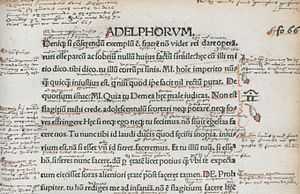Adelphoe

Adelphoe (also written Adelphoi and Adelphi, English: The Brothers) is a play by Roman playwright Terence, adopted partly from plays by Menander and Diphilus. It explores the best form of child-rearing. It was first performed in 160 BC at the funeral games of Aemilius Paulus.[1] It inspired Moliere's The School for Husbands.[2]
Plot
Demea, father to Aeschinus and Ctesipho, decides to separate his children and raises Ctesipho while allowing his brother Micio to raise Aeschinus. Demea is a strict authoritarian father, and Micio is permissive and democratic. Ctesipho falls in love and Aeschinus decides to steal the girl away, accepting all blame for the affair. Demea and Micio spar over who did a better job at raising their sons. At the end of the play, Ctesipho marries the music girl and Aeschinus marries Pamphila.
Characters
- Micio - Demea's brother and adopted father of Aeschinus
- Demea - Micio's brother and father of Aeschinus and Ctesipho, raised Ctesipho
- Sannio - A procurer, owner of the slave "Music Girl"
- Aeschinus - son of Demea, raised by Micio
- Syrus - slave of Micio
- Ctesipho - son of Demea raised by Demea
- Canthara - Sostrata's servant
- Geta - Sostrata's slave
- Hegio - close friend of Sostrata's late husband
- Pamphila - daughter of Sostrata
- Music Girl - slave of Sannio
- Dromo - Demea's slave
- Sostrata - widowed woman who lives next to Micio
- Parmeno - a slave[3]
References
- ↑ "Adelphi - a synopsis of the play by Terence". Theatre History.com. Retrieved November 20, 2008.
- ↑ https://archive.org/stream/newinternational01gilm#page/114/mode/1up
- ↑ Riley, Henry Thomas (ed.). "P. Terentius Afer, Adelphi: The Brothers". Perseus Digital Library. Retrieved November 20, 2008.
External links
 Latin Wikisource has original text related to this article: Adelphoe
Latin Wikisource has original text related to this article: Adelphoe- The play's Latin text at TheLatinLibrary.com
- The play translated into English on Perseus
- Review in BMCR of 2010 translation by David Christenson